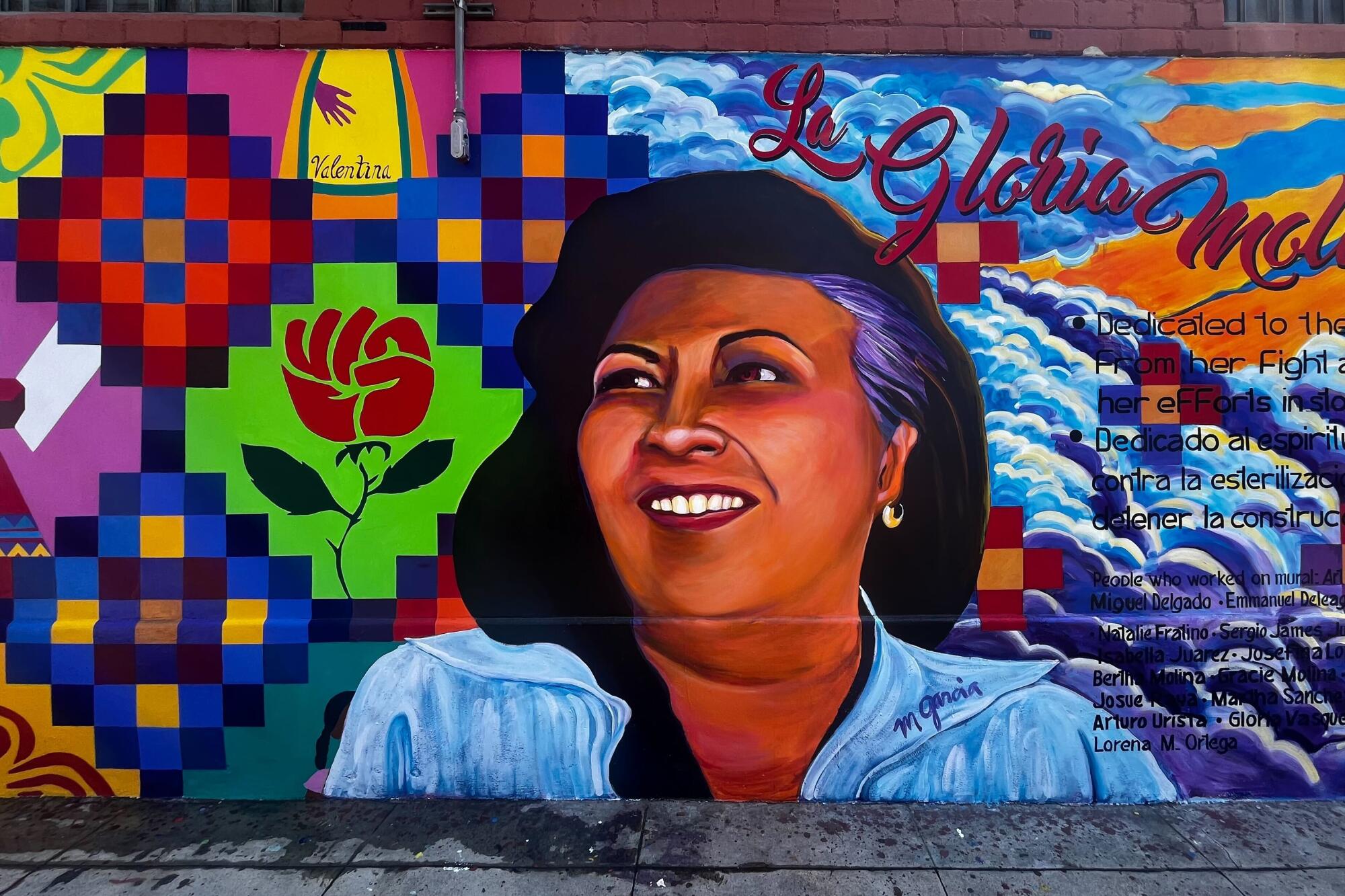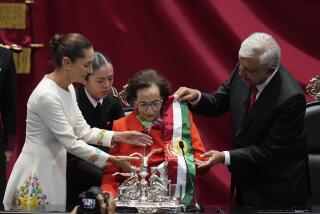
Casa 0101’s new play, ‘A Woman Named Gloria,’ by playwright Josefina Lopez explores Gloria Molina’s political rise, the challenges of public service and a legacy that lives on.
Gloria Molina’s civic-driven spirit guides a budding Latina politician in a new play penned by “Real Women Have Curves” writer Josefina López.
López is artistic director at Casa 0101, which is presenting “A Woman Named Gloria,” starring Karla Ojeda and directed by Corky Dominguez. It highlights Molina’s trailblazing political journey, which exceeded people’s expectations of a women in power.
For the record:
10:50 p.m. Aug. 31, 2024An earlier version of this story said Casa 0101 renamed an auditorium for Molina after she died. The auditorium was renamed a month before she died.
Molina died at age 74 of cancer last year, but her influence in politics as the first Latina county supervisor, City Council member and Assembly member in Los Angeles remains salient.
Honoring Molina has been a personal endeavor for López, who was a student at East Los Angeles College when she first learned about the woman she would eventually befriend and collaborate with on arts projects. As a promising writer, López became enthralled by Molina’s 1990 L.A. County supervisor campaign against Art Torres when he allegedly called her a “burrito.”
“A male politician could get away with that and no one [would hold] him accountable,” López said.
In a statement to the Times, Dean Florez, former campaign manager for Torres, denied the incident ever happened.
By that time, the Montebello-born Molina had run a successful campaign against Richard Polanco for California Assembly in 1982 and was elected to a City Council seat in a 1986 landslide.
“When she won, I was like, I want to tell her story,” López said, adding that it also needed to take a deeper look at the challenges of life in politics.
Texas Rep. Joaquin Castro shares his yearly cinematic picks featuring Latino-driven stories that he hopes will be added to the National Film Registry.
Molina’s biggest critics were outsiders, according to López, who often labeled the politician as “angry.” For example, fellow Supervisor Michael Antonovich accused Molina of governing “by tantrum” in 1993, The Times reported in an article headlined “The Politics of Anger.”
“Who wouldn’t be angry if you’re being discriminated against, and you grow up watching your parents being discriminated against for being Latino, for being undocumented, for being Spanish speakers,” said López.
López and Molina met at an awards ceremony honoring López for her 2002 film, “Real Women Have Curves,” and cemented a long friendship fused by their love of the arts.
In 2015, Molina formed the Eastside Arts Initiative, a grant program supporting creative artists in East Los Angeles. Casa 0101, which helped launch the acting careers of Xolo Maridueña (“Cobra Kai”) and Belissa Escobedo (“Happy’s Place”), has been a recipient of the grant funding for various projects.
“With her help we’ve been able to produce a lot of plays here,” López said.
As tears welled up, López recalled the time when Casa 0101 was unable to pay its rent; Molina stepped in to cover the costs. “She wouldn’t let our theater close down because she saw the value in it,” López said.
About a month before Molina died, Casa 0101 renamed its main stage the Gloria Molina Auditorium in her honor.
“She showed many people the power and courage of a Latino woman,” López added.
A temporary exhibit, “Gloria Molina: Madrina of the Eastside,” also opens today. Curated by Chicano artist Jimmy Centeno, the gallery introduces 10 artists who depict Molina at different stages in her life. A mural by renowned painter Margaret Garcia also was unveiled.
Tributes to the Latina trailblazer began earlier this week, with the L.A. City Council designating Aug. 29 as Gloria Molina Day. L.A. Mayor Karen Bass, Councilmembers Kevin de León and Monica Rodriguez and civil rights leader Dolores Huerta attended the Casa 0101 mural unveiling.
The day coincided with the 54th anniversary of the Chicano Moratorium against the Vietnam War, Molina’s political awakening. “It transformed her,” López said.
The plight of Chicano activists sparked Molina’s journey to seek justice. In her college years she staunchly battled the sterilization of Mexican women without their consent at Los Angeles County-USC Medical Center. Before launching a career in politics, she worked as a legislative assistant in Sacramento and then for the Carter administration in Washington.
Two months before she died, in an interview with Times columnist Gustavo Arellano, Molina was asked why she felt compelled to run for office.
“Because I had to,” Molina said. “If you were a Chicana in the Chicano movement, things had to change. And the guys were still very sexist. So, very frankly, we had to push and push.”
“A Woman Named Gloria” runs through Oct. 6 at Casa 0101.
More to Read
The Latinx experience chronicled
Get the Latinx Files newsletter for stories that capture the multitudes within our communities.
You may occasionally receive promotional content from the Los Angeles Times.








